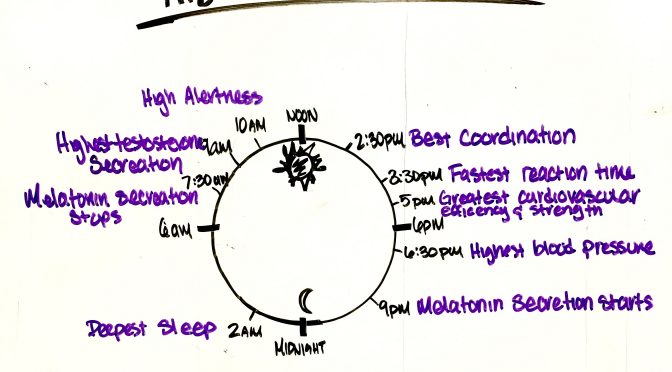
Hormonal balance
| Hormonal balance is key to living a healthy life.
The Circadian Clock above shows a snapshot of what our bodies should be secreting and at what times during the day. While it’s definitely not all our hormones, these are the ones applicable to recovery and health from a fitness standpoint. Ideally our lives would support the natural Circadian Clock we are meant to follow, but unfortunately lifestyle factors, jobs, and obligations can really screw up our natural daily cycle of hormonal balance, leading us to sickness, shrunken muscle tissue, hunger cravings, feeling tired when we should be wide awake and alert or wide awake, when it’s really time to go to sleep. All leading to a slow and steady decline in health of over time. Have you ever heard someone brag about not needing much sleep to function and still be productive? Well the body is pretty awesome at dealing with the crap we put it through. But just like any bad habit or behavior, we usually don’t feel the effects of these bad decisions until a compounding effect catches up to us over time (you don’t get fat from one soda right?). Continuous rebellion against the Circadian Clock over time can lead to a laundry list of health problems, but some of the most common and easily changeable habits that make this happen are: 1. A lack of deep sleep. This can put the body in a catabolic state rather than anabolic, leading to shrunken muscles and brain size. All day we build up plaque in the brain, and deep sleep is where we clean this plaque out. It’s also where our bodies do most it’s rebuilding of muscle tissue. Poor sleep is now being linked to Alzheimer’s and dementia!!!! 2. Increased cortisol levels (a stress hormone) lead to a lowered immune system. Our Cortisol levels are at their highest when we wake and throughout the day they slowly lower, until they run out and we fall asleep. During sleep our cortisol levels slowly rise until they are full and we wake up again. However, our alarm clocks are usually the ones waking us up out of slumber, not our hormones. This leads to Cortisol levels running low earlier than we’d like, so we reach for a “pick me up” and start the disruption of the Circadian Clock. This ultimately leads to you getting sick more often or be at risk for disease from too much stress on the body. 3. Feeling tired later in the day? Do you grab a soda, energy drink or coffee? Well caffeine has a half life of 6 hours. This means that a cup of coffee at 3pm will remain in your system until 3am! Yea you may be someone who can sleep right after chugging a Venti double shot americano, but your sleep wont be deep (where recovery happens) and you’ll throw off the Circadian Clock all night long! 4. Skipping Breakfast! Are you someone who’s “just not hungry” in the mornings, so you have a cup of coffee and your first meal usually happens at lunch? Well one of the best ways to get your Circadian Clock back on track is to have a balance breakfast first thing in the morning. Think of it like a Jumpstart for your hormonal balance. This will also keep you from having those “hungry cravings” throughout the day. Another sign of hormonal imbalance. So how do you fix your Circadian Clock? 1. Get rid of the phone in the room! Turn off the lights, black out the room, breath deep for 2-5 minutes and fall asleep naturally. Can’t fall asleep? Well that tells you just how bad you need this! Try reading (a book! not a tablet) something fiction and boring. I hear the Coast Range Nutrition Challenge book from last year helps 😉 2. No caffein after 10am. This will give you a fighting chance of falling asleep and getting some deep sleep! 3. Eat a balanced breakfast within an hour of waking up. 4. Get some Vitamin D! Good exposure to morning sunlight helps maximize the effect of cortisol release by giving your body a little kick start to get your circadian rhythm normalized and allow cortisol levels to naturally decline later at night. |
2017 01 04